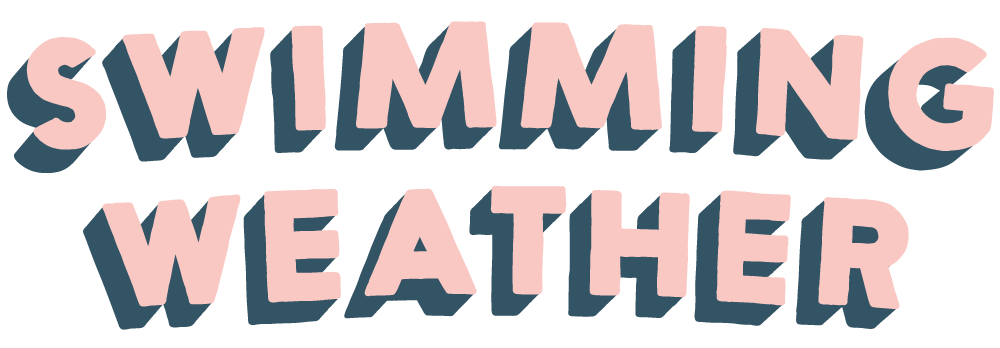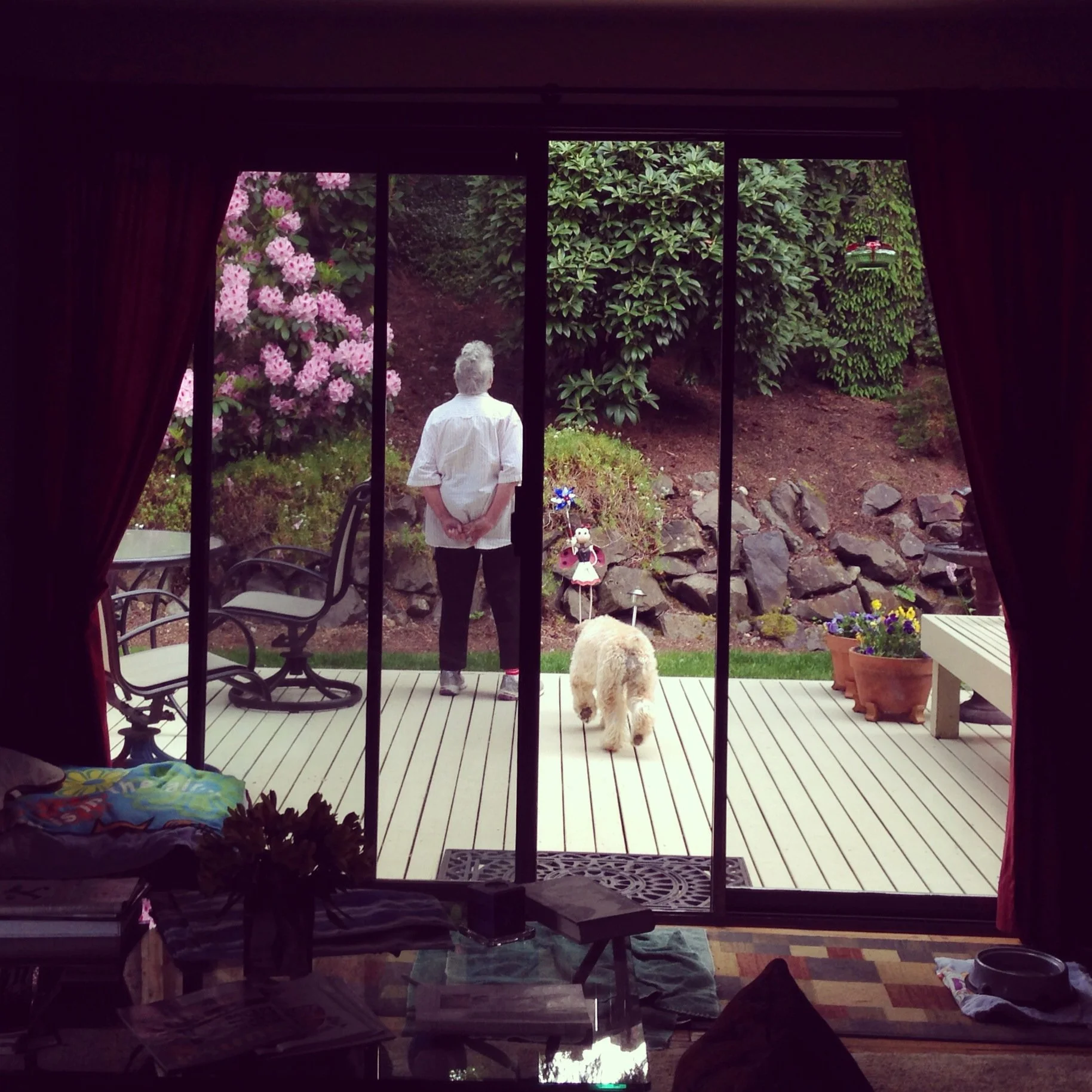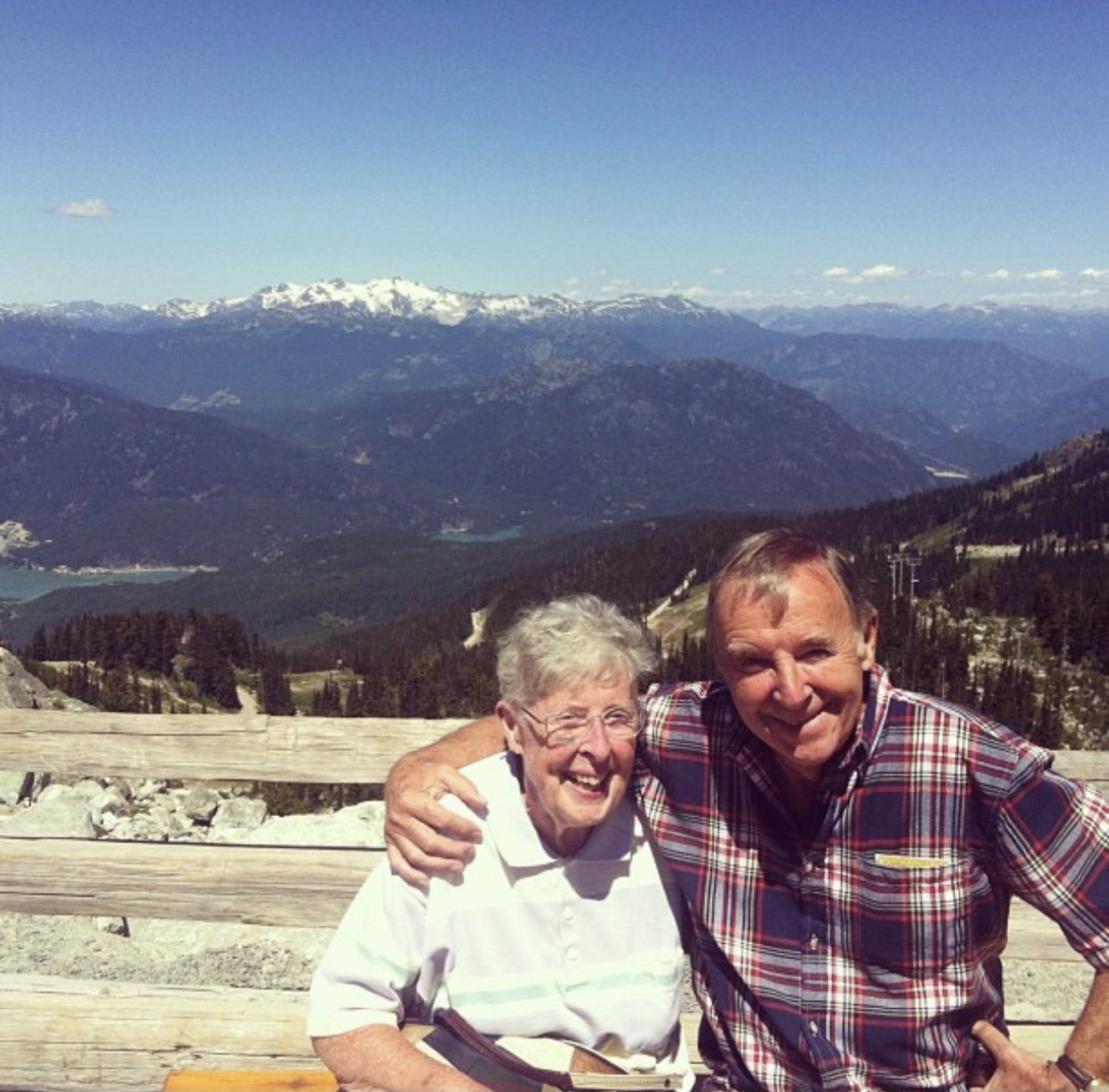Marilyn
Marilyn falls and breaks her arm. My father calls her two days later to see how she is feeling. When asked what she will do with her day, she says that she will go for a walk. He tells her to take somebody with her — a suggestion that's declined with a tone of stubbornness and defense.
"Well, just a few days ago, you were out and fell and broke your arm," he reminds her.
"It's just an arm," she says.
The day before she came downstairs wearing only her bra. Bill, from across the street, came over to see how she was doing, and she answered the door as if clothes are an afterthought for everyone. My father relays the story. "And of course, Alan was running around, yelling."
For the amount of time that I spend worrying about Marilyn, I spend more time admiring her. Getting old has never looked more like a process of becoming young again.
"Not for sissies," my mother says.
Another mild stroke. Another act of forgetting. Another way to be lost. This time in her own home, in front of her son Alan, in spite of him. Who am I? Where am I? Who are you? What's happening?
It is my greatest fear, and yet she is living.
When Marilyn comes to visit, she does not remember who I am. She comes into my parents’ kitchen on a Saturday morning, wearing a floral nightgown that reminds me of my grandmother: white with bright pinks, yellows, blues, and greens. It hangs to her knees, with a collared shirt beneath it. Her expression is a question. Everything is a question.
She cannot remember where she is. If she is coming or going. Staying or leaving. She asks "Is this a stop on a way to somewhere else?"
We offer toast and eggs, but she stands beside the sink trying to piece the story together. Touching her gray and white hair, she asks:
"Am I in the same room?" Over and over.
"Are we going somewhere else?"
"I can't tell what's a dream and what's real."
And finally, delivered in exasperation and self-mockery, hands raised and laughing, just:
"Whoooo ammmm I?"
We settle in at the breakfast table with my father’s iPod on shuffle. He plays her Jerry Lee Lewis' Bad Moon Rising, and she stands to dance. We all dance, except my father who sits at the table tapping his hand on the back of the couch and eating buttered toast. He stares in at her in a kind of awe, as she spins across the wood floor, dizzy and unsure of her feet, but still — dancing. We hold onto the backs of the chairs and countertops. She bops my dad on the head and spins again.She says "It's a day for sun and a day for dancing."
My father disappears behind the cabinet to change the music.
"Where'd that guy go?" she says, laughing, and again
"Am I in the same room?"
Settling down to breakfast at the table, she says her mother (my grandmother) loved butter on her toast. My father agrees with a "hohhhh yes," and she says to my father (her brother) "Did you know my mother?"
He stares at her.
"Just barely," he says and looks at his toast before shaking his head and winking at me.
By the second day, she will mistake my dad for her husband Alan, who died 5 years ago. She is happy when she is dumping sugar in her coffee and teasing my dad ruthlessly. We play along.
She watches my mother stretch in the mornings and stands in the kitchen waving her arms up and down like a bird trying to take flight.
"Are you okay?" my dad asks her
"I dooooooon't knooooooooow," she cries back.
Marilyn is always commenting on the trees and the sky and the clouds. My father is always giving her tasks. It's beautiful, really, the way they are together. The plays they put on for each other; a give and take of feeling and performance. Another day at the opera.
Getting out of the car for a walk, he asks her to hold two orange dog bags. "What do I do with them?" she asks. "Just hold them," he says.
She stares at them in her hands and then kisses them one at a time.
"Well, I kissed them, so there."
"Well, that's good," he says "I don't think they've ever been treated that well before."
"No, I doubt it" Marilyn says and smiles at me.
We drink tea and coffee at Shopping Center picnic tables, and it is sitting outside at a metal green table that I learn about Mortimer — Marilyn’s first boyfriend. He was a pilot, and he took her up in a plane beside the Vancouver waterfront, unexpectedly and as a special treat. I listen skeptically, but my father nods with raised eyebrows to signal the story's authenticity.
"Mort," he says.
For years, Marilyn has told me, on and off, that she wanted to be a pilot; that she always thought it would be fun to fly for a living. But Mortimer never graced any of these conversations or explanations. Now, more than ever before, she is an iceberg of the Antarctic. Whole lives buried beneath her. I can find scraps and sentences to piece together, but the overall narrative and experience is hers alone. Even then?
Maybe not.
When we return home, my father presses play on the landline message machine. A robotic voice punctuates the series.
"End of final message.”
"I hear these things, and I think they are speaking to me.” Marilyn says, grimacing exaggeratedly before breaking into a laugh. “I think — that’s it!”
She settles into the routines of walking and breakfast. In the afternoons, we sit on the back porch together and talk about the branches of the trees. We compare the buzzing of the bees to the buzzing of the hummingbirds. We expand, over and over again, upon the luck of being here. My parents home becomes her home until she mistakes it as that — not just in this present moment, but in the past.
About the trees in the backyard: "They were just little saplings when we arrived."
About the road construction on the way to a thrift store: "I never imagined when we moved here that that would ever happen. But now things are getting all used up.”
It’s true, she mistakes almost everything. Not just events, but words. Forgetting some and fumbling over others, but her spirit remains gentle. Our last afternoon of this particular, we are sitting on the porch together, soaking up the sun like a couple of cats in the early Spring, and she asks me, "Remember that saying 'Love makes the world go round’?" I nod, looking up from my magazine.
"I think they were talking more about these things," she says and gestures at the trees.
"Things that have to be here on their own…and they do it."









